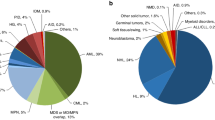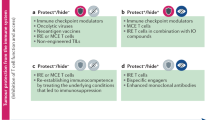Abstract
Cellular therapies manufactured from cells of haematopoietic origin, such as CAR-T–cell therapies, provide a revolutionary treatment for patients suffering from haematological diseases. Nonetheless, there are considerable challenges in the implementation of these therapies in this rapidly evolving field. These challenges include but are not limited to the complexity of the supply chains for these living drugs and the management of side effects, requiring centre qualification as well as additional and ongoing education of health care professionals; the long-term follow-up of patients treated with therapies with curative intent; the myriad regulatory requirements at the European Union and local level; and reimbursement of the treatments by budget-constrained authorities.
You have full access to this open access chapter, Download chapter PDF
Similar content being viewed by others
Cellular therapies manufactured from cells of haematopoietic origin, such as CAR-T–cell therapies, provide a revolutionary treatment for patients suffering from haematological diseases. Nonetheless, there are considerable challenges in the implementation of these therapies in this rapidly evolving field. These challenges include but are not limited to the complexity of the supply chains for these living drugs and the management of side effects, requiring centre qualification as well as additional and ongoing education of health care professionals; the long-term follow-up of patients treated with therapies with curative intent; the myriad regulatory requirements at the European Union and local level; and reimbursement of the treatments by budget-constrained authorities.
The challenges in the field of cellular therapies require cross-stakeholder collaboration, including patient representatives, health care professionals, pharmaceutical companies, health authorities, health technology assessment (HTA) bodies and reimbursement agencies, and medical organizations at both the European and national levels. For these reasons, EBMT and EHA have launched the GoCART Coalition, a multistakeholder initiative aiming to promote patient access to novel cellular therapies manufactured from cells and tissues of haematopoietic origin and to contribute to health and well-being through innovation via multistakeholder collaboration on clinical data, standards of care, education, and policy.
The aims of the GoCART coalition:
-
Improve health outcomes for patients.
-
Engage stakeholders and establish a sustainable European coalition in the field of cellular therapy.
-
Collaborate and share data and knowledge to prevent duplication of effort and maximize resources.
-
Promote harmonization of data collection, education, standards of care, regulatory approval, and reimbursement processes in Europe.
-
Set up a pre- and post-marketing registry that supports regulatory decision-making and shared research purposes.
-
Develop a cellular therapy education and information programme for patients and health care professionals.
-
Harmonize standards of care and centre qualification.
-
Advance policies that further the shared mission and vision.
The coalition is open to all stakeholders relevant to achieving its mission. Both institutional and individual members are invited to participate in work packages that implement the Coalition’s mission, vision, and goals. Work package chairs are accountable to an executive committee with a balanced representation of stakeholders, and the executive committee functions as the primary decision-making body and determines the overall strategy of the coalition.
The following content work packages have been created:
-
1.
Data harmonization
-
a.
Context: In Europe, clinical data from patients treated with gene and cellular therapies are reported to many registries, each built for a limited purpose, with different governance rules and specific software tools managing the data. This results in siloed data, inefficiencies, and duplication of efforts.
-
b.
Overall aim: Create a central EU data registry for harmonized collection of clinical data on patients treated with cellular therapies to support collaborative studies and regulatory decision-making.
-
a.
-
2.
Standards of care
-
a.
Context: Gene and cellular therapies are inherently complex products, and treatment administration is restricted to qualified centres. With rapid developments and pending product approvals, there is a need to develop treatment guidelines and harmonize centre qualification procedures across pharmaceutical companies, accreditation bodies, and national requirements.
-
b.
Overall aims: (1) To develop harmonized guidelines on patient and product management for health care professionals; (2) to reduce inspection burden and redundancies by developing and implementing consensus-driven requirements and qualification standards for clinical teams delivering gene and cellular therapies from cells and tissues of haematopoietic origin.
-
a.
-
3.
HTA process
-
a.
Context: Health technology assessment bodies and reimbursement agencies need to make decisions based on the best available estimates of the properties and impact of new therapies. This is particularly challenging for gene and cellular therapies, considering that authorizations may be based on small patient groups, limited availability of (long-term) follow-up and comparator data, the high costs of the products, and the increasing number of therapies on the horizon. Although national procedures on health technology assessments and reimbursement vary considerably, there is a common need for reliable safety and effectiveness data.
-
b.
Overall aim: Leveraging the central registry for gene and cellular therapy as a suitable data source for health technology assessment.
-
a.
-
4.
Education
-
a.
Context: Gene and cellular therapies are complex products that require comprehensive and ongoing training of health care professionals as well as patients and caregivers. A plethora of training courses are already offered by MAHs as well as health organizations, which can lead to considerable overlap.
-
b.
Overall aim: Develop harmonized educational programmes for different groups of health care professionals and patients.
-
a.
-
5.
Policy and advocacy
-
a.
Context: Gene and cellular therapies are subject to EU and national regulations affecting their preparation, administration and patient access. These new therapies challenge these regulations, which were designed for more traditional pharmaceutical products, and health authorities are assessing how they will adapt.
-
b.
Overall aim: Represent and promote the interests of the GoCART coalition and its stakeholders in EU policy-making by engaging with EU institutions and other relevant stakeholders.
-
a.
-
6.
Scientific excellence
-
a.
Context: Scientific research on gene and cellular therapies has increased substantially in recent years. With real-world data becoming increasingly available, many scientific questions can be explored from different perspectives. Only by working together can we leverage enough data to conduct meaningful research. GoCART wants to maximize the use of data collected in the central registry as well as data available to other stakeholders and to facilitate further collaboration between stakeholders. While strongly protecting confidentiality, the guiding principle should be ‘collect once, use often’ to advance our knowledge in the field of gene and cellular therapies, support better decision-making, and drive efficiencies for all stakeholders.
-
b.
Overall aim: Stimulate scientific discussion across stakeholders, facilitate the setup of joint research projects, and avoid duplication of scientific efforts.
-
a.
-
The GoCART cell coalition is a multistakeholder initiative in the field of cellular therapies for haematological disease.
-
Stakeholders include patient representatives, health care professionals, pharmaceutical companies, health authorities, health technology assessment (HTA) bodies and reimbursement agencies, and medical organizations at both the European and national levels.
-
The mission is to promote patient access to novel cellular therapies manufactured from cells and tissues of haematopoietic origin and to contribute to health and well-being through innovation via multistakeholder collaboration on clinical data, standards of care, education, and policy.
-
The GoCART Coalition aims to achieve its mission through activities organized in work packages on (1) data harmonization, (2) standards of care, (3) HTA, (4) education, (5) policy and advocacy, and (6) scientific excellence.
Take a look at our webpage for the most recent information: https://thegocartcoalition.com
Author information
Authors and Affiliations
Corresponding author
Editor information
Editors and Affiliations
Rights and permissions
Open Access This chapter is licensed under the terms of the Creative Commons Attribution 4.0 International License (http://creativecommons.org/licenses/by/4.0/), which permits use, sharing, adaptation, distribution and reproduction in any medium or format, as long as you give appropriate credit to the original author(s) and the source, provide a link to the Creative Commons license and indicate if changes were made.
The images or other third party material in this chapter are included in the chapter's Creative Commons license, unless indicated otherwise in a credit line to the material. If material is not included in the chapter's Creative Commons license and your intended use is not permitted by statutory regulation or exceeds the permitted use, you will need to obtain permission directly from the copyright holder.
Copyright information
© 2022 The Author(s)
About this chapter
Cite this chapter
Terwel, S.R., Kuball, J., Dreyling, M., Cerisoli, F. (2022). GoCART. In: Kröger, N., Gribben, J., Chabannon, C., Yakoub-Agha, I., Einsele, H. (eds) The EBMT/EHA CAR-T Cell Handbook. Springer, Cham. https://doi.org/10.1007/978-3-030-94353-0_43
Download citation
DOI: https://doi.org/10.1007/978-3-030-94353-0_43
Published:
Publisher Name: Springer, Cham
Print ISBN: 978-3-030-94352-3
Online ISBN: 978-3-030-94353-0
eBook Packages: MedicineMedicine (R0)




